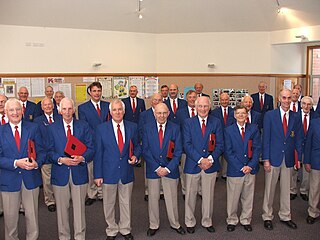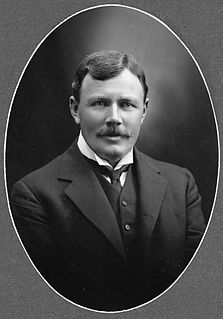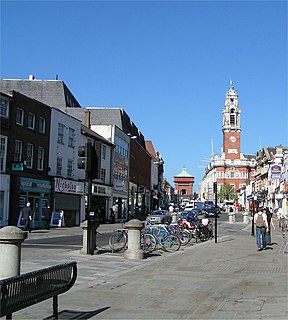Alistair Te Ariki Campbell, ONZM was a New Zealand poet, playwright, and novelist. His father was a New Zealand Scot and his mother was a Cook Island Maori from Penrhyn Island.
Sir William David Southgate is a New Zealand conductor and composer. He was the first New Zealand-based artist to be knighted.

William Downie Stewart was a New Zealand Finance Minister, Mayor of Dunedin and writer.

Frank Langstone was a New Zealand Member of Parliament, Cabinet Minister and High Commissioner to Canada.

City Choir Dunedin, formerly the City of Dunedin Choir, is an auditioned mixed-voice choir in Dunedin, New Zealand. It accepts singers of all age groups from the wider Dunedin community and performs large-scale classical choral works. The choir's membership grew from an initial 45 to around 120 as of 2012. The Choir is a member of the New Zealand Choral Federation (NZCF), which was formed in 1985 to promote high quality choral singing in New Zealand.
Andrew Cantrill is a British-born organist and choral director. He has held cathedral positions in New Zealand and the United States, and is now organist of the Royal Hospital School, Holbrook, Suffolk. He is a Fellow, prize-winner and former Trustee Council member of the Royal College of Organists, and a Fellow of the Royal Society of Arts. He is a tutor for the RCO Academy Organ School, an examiner for the Associated Board of the Royal Schools of Music, an active recitalist, and a sought-after broadcaster, writer and presenter.
The following lists events that happened during 1860 in New Zealand.
The following lists events that happened during 1848 in New Zealand.
Jonathan Herbert Elworthy was a New Zealand Member of Parliament for Oamaru and Waitaki, in the South Island, representing the National Party.

William Burgoyne Taverner was a New Zealand Member of Parliament for the United Party, and Mayor of Dunedin.
Jeremiah Connolly was an Independent Liberal Member of Parliament for Mid-Canterbury, in the South Island of New Zealand.

William Earnshaw was a New Zealand Member of Parliament for two Dunedin electorates representing the Liberal Party. He later served on the Legislative Council. He was one of the first labour representatives in Parliament.

Sir James George Barnes was a New Zealand politician of the National Party.

Raffaello Squarise, also known as Raphael Squarise, was an Italian violinist, teacher, conductor, and composer, who settled in Adelaide, South Australia, and Dunedin, New Zealand. He was a pioneer in the establishment of classical music in New Zealand.

The Royal Dunedin Male Choir is one of New Zealand's oldest male choirs. Their repertoire includes popular tunes, hymns, operatic choruses, folk songs and traditional melodies. The Choir undertakes fee-paying and charity engagements throughout the Otago, Southland and South Canterbury regions of New Zealand.

William Hughes Field was a Member of Parliament in New Zealand; first for the Liberal Party, then Independent, and then for the Reform Party. He made a significant contribution to the development of tramping in the Tararua Range.
Joseph Humfrey Anger was a Canadian organist, pianist, conductor, composer, and music educator of English birth. His compositional output consists mainly of church music and works for solo piano and organ. Some of his more well known works are A Concert Overture for organ (1895), the patriotic song Hail Canada (1911), and Tintamarre, Morceau de Salon (1911), all of which were published by Whaley, Royce & Co. The latter piece was notably the first published classical composition to thoroughly integrate true tone clusters. He also wrote the textbooks Form in Music and A Treatise on Harmony, both of which were widely used in music schools in North America.
Mary Eleanor Joachim (1874–1957) was a New Zealand book-binder in the Arts and Crafts tradition.
Brian Harford Robinson was a New Zealand inorganic chemist. He is noted for his contribution to cluster chemistry and the design of organometallic compounds with biomedical applications.
The 1949 New Year Honours in New Zealand were appointments by King George VI on the advice of the New Zealand government to various orders and honours to reward and highlight good works by New Zealanders, and to celebrate the passing of 1948 and the beginning of 1949. They were announced on 1 January 1949.


















